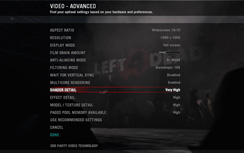Core i7 Christmas '08 Graphics Performance
December 17, 2008 | 13:42
Companies: #ati #bit-tech #christmas #nvidia #test

Left 4 Dead
Publisher: SteamLeft 4 Dead is Valve’s co-operative zombie splattering masterpiece, and is a strong candidate for PC Game of the Year. Players are pitted against hundreds of screaming, slavering infected in numerous post apocalyptic environments, ranging from an over run hospital to a ruined airport and the co-operative experience of fighting off the horde with a few friends is second to none.
Left 4 Dead uses a modified version of Valve’s in-house Source Engine, an engine well known for its ability to scale from low end right up to bleeding edge graphics technology. The game makes use of not only the highest level of character detail yet seen in a Source Engine game, but also numerous filmic effects like film grain, vignetting and HDR to make the game feel more like an interactive movie.
There are also the huge waves of psychotic infected that continually mob the players, and the handful of special infected that try and thwart the survivors attempts to escape.
For testing Left 4 Dead we use a custom timedemo recorded during one of the most dramatic moments in the game, the finale of the dead air campaign. With hundreds of infected, multiple attacks from boss zombies and plenty of fire and explosive effects, it’s a great test of what the Source Engine and Left 4 Dead can do.
All in game detail settings are set to their highest levels, with anti-aliasing and anisotropic filtering set from inside the game.
The Source engine scales remarkably well across the range of hardware we've tested here – SLI and CrossFire only really begin to make sense as soon as you get up to 2,560 x 1,600 though, as that is where you'll find the frame rates on the single GPU solutions fall back significantly but not to the extent where the game is unplayable – 2,560 x 1,600 with 4xAA is the first time we really see sub 50 fps performance on the single GPU graphics cards.
Generally, the GTX 260+ is a little slower than the Radeon HD 4870 1GB, but not to the extent where it's going to have a noticeable impact on the gameplay experience – the difference is less than five frames per second at 1,920 x 1,200 8xAA for example and the frame rates are in and around 60 fps at these settings. It's 8xAA where Nvidia's weakness is though.
With SLI and CrossFire though, 8xAA isn't a problem even for the GeForce GTX 260+ SLI configuration and it actually ends up outperforming the Radeon HD 4870 1GB CrossFire (and 4870 X2) setups at 2,560 x 1,600 with both 4x and 8xAA applied.

MSI MPG Velox 100R Chassis Review
October 14 2021 | 15:04









Want to comment? Please log in.